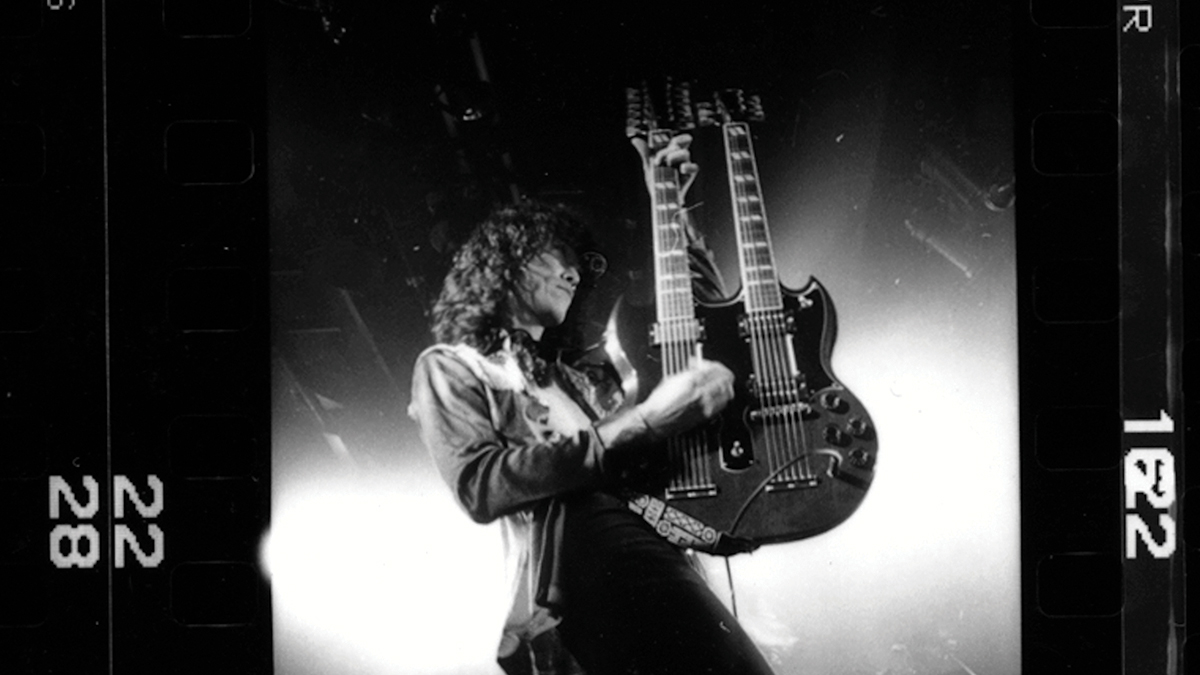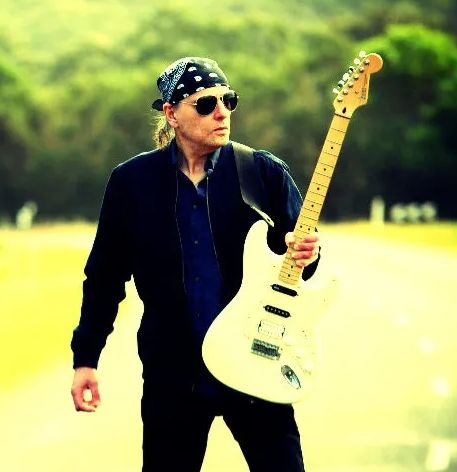“Jimmy sat there for the whole two hours then waited until after the show before he asked me, ‘How did you find out how to make my sound?’” Meet Mr. Jimmy, the Japanese kimono salesman who has dedicated his life to becoming Jimmy Page
This is the story of Akio Sakurai, aka Mr. Jimmy, and his lifelong quest to replicate Jimmy Page’s guitar style and tone, and perform Led Zeppelin just as Page did back in the day – and, eventually, in front of the man himself

We all have our own favorite guitar hero – that player who first inspired us to pick up a guitar and whose style informed our individual approach to playing. But the sensational tale of Akio Sakurai – a Japanese guitarist who dedicated three decades to quite literally become his hero, Jimmy Page – takes this phenomenon to the extreme.
Sakurai’s story is the subject of a new documentary, Mr. Jimmy, which charts his journey from aspiring guitar player all the way to adopting the persona of the film’s title character – and beyond. But Sakurai’s desire to become Page extends far beyond the fretboard; Sakurai adopted the chops, persona and style of Page in an unrivaled display of passion and devotion to his idol.
As per the film’s description, Sakurai (a kimono salesman by day) dedicated his life to honoring Page’s playing, and to do so suitably assumed the role of Mr. Jimmy – his nightly rockstar alter ego of 30 years who recreated legendary Led Zeppelin concerts song for song, note for note, for audiences in Tokyo clubs.
When the real Page caught wind of Mr. Jimmy and took a trip to witness his playing first-hand, Sakurai’s life was set on a new wild trajectory that saw him leave his “salary man” job and move to Los Angeles to pursue his dreams of, well, being Jimmy Page.
There – as seen in the film – Mr. Jimmy juggles culture shock and language barriers as “Akio’s idyllic vision of America meets with reality,” with the guitarist joining tribute act Led Zepagain and later auditioning for Jason Bonham, son of drummer John.
“I want to be Jimmy Page,” Sakurai says in the film’s first official trailer. “To play this music in a lackluster way would be inexcusable… I just want to express the magic of Jimmy Page. That’s all.”
Notably, the film took nearly eight years to make and features 30 Led Zeppelin songs as performed by Mr. Jimmy. We actually caught up with Sakurai more than a year ago – but we held onto our interview as we awaited word of the film’s official release. That time is now.
Get The Pick Newsletter
All the latest guitar news, interviews, lessons, reviews, deals and more, direct to your inbox!
Where and when did your love for Jimmy Page begin?
“I started playing guitar when I was 14, and though I knew who Jimmy Page was, I was too young to understand his awesomeness. I finally understood it all when I turned 17, which was when I pursued the path I am on.”
You’re able to play every Page guitar solo, including his improvised solos from any Led Zeppelin show. How do you go about finding all the live material and then learning it?
“Just by listening to the studio recordings, you can’t know everything about what’s being played, so I listened to every year’s live bootleg version where I would analyze, compare and study; it was in this manner that I’d notice clearly how Jimmy was playing something and in what way he was playing it.
“There is this shop in Japan; it’s like a secret shop with no sign or anything – it’s just a door entrance – that sells many Led Zeppelin bootleg versions. The owner of the shop is very supportive of me, so every time a new bootleg version comes in, he shares it with me so I can study it. He also has multiple friends who have ways of getting their hands on bootleg versions, so they also share them with me.”
Was it difficult to not only track down the same gear Page used, but also to replicate his sound exactly?
“I studied for many years figuring out how to produce the same sound Jimmy Page produced using the 1959 Les Paul Standard in the ’70s – so I use a 1959 Les Paul that’s been modified based on my research. It is very helpful to study the real 1959 guitar he used because this gives me clues for how to make specific tones with the other reissued guitars I use.
“The hardest part of all was to figure out exactly what Jimmy Page’s engineers at the time had done to his guitars for modifications. The biggest factor that affects the tones is the pickups, so my engineers and I studied and tried for many years to achieve this.
“This journey is still continuing; my pickups still get updated every time we discover something new in order to get closer to Jimmy’s sound and tones. Just because you have the same guitar doesn’t mean it can produce the same sound, as the pickup sound is integral. The quality of each part of the guitar, the pick’s material and your picking style – when these ingredients are combined, it helps achieve Jimmy Page’s tone.”
You also play a signature LS-Jimmy Tokai guitar, correct?
“Tokai learned that a Tokai Les Paul was my very first guitar when I set upon my journey to study Jimmy Page at age 17, so they made a signature model for me. As I didn’t want to just copy Gibson’s original model, I asked Tokai to accentuate the Les Paul’s top arch of the body, and all the parts had to be a vintage clone to fit in with the Mr. Jimmy pickups, which are based on Page’s.
My engineer applied a special treatment onto the circuit on the amplifier that the signal from the guitar goes in
What about when it comes to Page’s Marshall amps?
“I use multiple Marshall amps that were made from 1969 to the early ’70s, along with different types of vacuum tubes, depending on what era of Led Zeppelin I’m trying to recreate. With these vacuum tubes, bias adjustments are done by my engineer in Japan to achieve the correct drive level and tones.
“Additionally, my engineer applied a special treatment onto the circuit on the amplifier that the signal from the guitar goes in. He uses only vintage parts, including a material for soldering made in the same age of the original Marshall amplifier to avoid spoiling its original vintage tone.
“If I want to achieve Jimmy Page’s amp tone from the early to mid era of Zeppelin, the older tubes produce better sound. It’s the combination of the guitar, amp and vacuum tube that creates Jimmy Page’s sound.”
Did you learn the material by slowing down vinyl records?
“I used to use tablature, but I started to notice that sometimes there were too many mistakes, so I stopped relying on it and instead started using my ears. Again, it is very important to use the same pickups because it really helps clarify the notes and sounds, so I pay a lot of attention to that.
“I also use the same instruments Jimmy used for the song in order to also get the exact notes – but it was very difficult in the beginning as it is rare to find the exact instrument. It’s also very expensive, but as I became more established, I found it was easier to access the right instruments.”
Every song is hard, but the studio version of Stairway to Heaven is difficult because Jimmy is playing an improvised solo on that, and to copy that improvisation wouldn’t make it an improvisation anymore
What was the most difficult piece to learn?
“Every song is hard, but the studio version of Stairway to Heaven is difficult because Jimmy is playing an improvised solo on that, and to copy that improvisation wouldn’t make it an improvisation anymore – it becomes just a copy. The challenge is to make it sound as if it’s improvised there and then.”
Is it an arduous task transforming into the persona of Jimmy Page?
“It’s not that I memorize the whole moves and choreography; it’s more about me becoming and transforming into Jimmy Page by wearing the same costumes and having the same instruments. Because I studied so much based on the videos and everything, it’s like I am performing like an actor on stage where I become Jimmy Page. It’s like when you wear a T-shirt or when you wear a suit, you will move differently.”
![[Achilles Last Stand]](https://img.youtube.com/vi/o39nVhvGm9s/maxresdefault.jpg)
Page caught one of your shows in a club in Japan in 2012. How did it feel to be performing in front of the real thing?
“I had only ever dreamed of meeting him one day, yet I never thought I’d actually perform in front of him. He had traveled all the way from England that same day so he must have been tired. He was with his friends too, but he never talked to them, as he was completely focused on my performance.
“I was very nervous at the beginning, but I soon noticed he started bopping his head and moving a little; because of that, I was able to forget my nervousness and enjoy performing. He sat there for the whole two hours and then waited until after the show before he came to talk to me. He asked me, ‘How did you find out how to make my sound?’ I replied, ‘I just listened to what you did and just studied it.’
“Over time people had asked me, ‘If you ever meet Jimmy Page, what would you ask him?’ That night, that moment had arrived. I asked him if it was okay for me to keep playing Jimmy Page and copying him. He answered, ‘Of course!’ That was the best day of my life.”
- Find out where to watch the film about Sakurai's story at Mr. Jimmy.
Joe Matera is an Australian guitarist and music journalist who has spent the past two decades interviewing a who's who of the rock and metal world and written for Guitar World, Total Guitar, Rolling Stone, Goldmine, Sound On Sound, Classic Rock, Metal Hammer and many others. He is also a recording and performing musician and solo artist who has toured Europe on a regular basis and released several well-received albums including instrumental guitar rock outings through various European labels. Roxy Music's Phil Manzanera has called him, "... a great guitarist who knows what an electric guitar should sound like and plays a fluid pleasing style of rock." He's the author of Backstage Pass: The Grit and the Glamour.
- Matt OwenNews Editor, GuitarWorld.com
“Jeff Beck used to love seeing him and Lenny play live – it feels full circle”: Lenny Kravitz guitarist Craig Ross has been playing Jeff Beck’s $490,000 Yardburst Les Paul onstage for an entire tour
“You got it!” Rare footage of Andy Summers teaching John Mayer how to play Message in a Bottle emerges









![John Mayer and Bob Weir [left] of Dead & Company photographed against a grey background. Mayer wears a blue overshirt and has his signature Silver Sky on his shoulder. Weir wears grey and a bolo tie.](https://cdn.mos.cms.futurecdn.net/C6niSAybzVCHoYcpJ8ZZgE.jpg)

![A black-and-white action shot of Sergeant Thunderhoof perform live: [from left] Mark Sayer, Dan Flitcroft, Jim Camp and Josh Gallop](https://cdn.mos.cms.futurecdn.net/am3UhJbsxAE239XRRZ8zC8.jpg)

